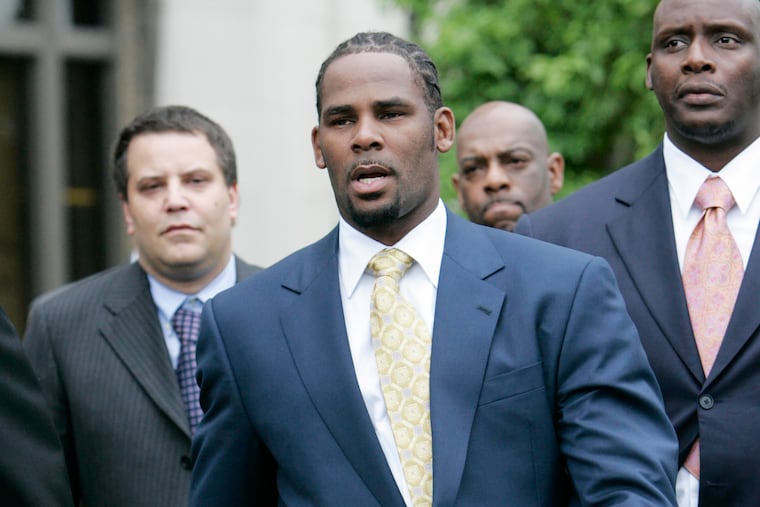The R. Kelly verdict shows why it’s important to listen to Black women when they speak up | Elizabeth Wellington
Monday’s decision made Me Too real for countless young women and girls — many of whom are Black — who are sexually assaulted and raped without any recourse.

I will never forget the way an R. Kelly videotape that showed the Grammy-winning singer allegedly urinating on a young girl made its way through the Black community 20 years ago in barbershops and salons.
“Oh, that’s just messed up,” said a guy I was dating after he’d seen Kelly’s deplorable behavior. But then he smiled and blamed the girl: “She had to be a freak.”
And then we just moved on. All the while, a heavy rotation of Kelly songs like “You Remind Me of My Jeep” and “Ignition” played loudly in our cars, at clubs, and during our workouts. The lyrics reduced women — Black women — to sexual objects. How could we not see we were a part of the problem?
Thank God for progress.
On Monday, the R&B singer — born Robert Sylvester Kelly — was convicted on nine counts, including racketeering and eight violations of a sex-trafficking law.
According to Rape, Abuse and Incest National Network (RAINN), only one in three women report rape and sexual abuse. Unfortunately, many Black girls fall through the cracks, said LaQuisha Anthony, a sexual assault survivor and founder of V.O.I.C.E., a Philadelphia-based sexual abuse and survivors network. These girls are secretly fondled by uncles, groped by security guards, or hemmed up by their pastors. They are told to keep quiet. And they do so because often their feelings of guilt overshadow their pain.
Although Me Too was started by Tarana Burke, a Black woman with Philadelphia ties, the movement was centered around women in the workplace. Monday’s verdict “was about the everyday Black girl,” Anthony said. “So many Black women saw themselves in the young girls he preyed upon. This case made the Me Too movement real for around-the-way girls, girls on the streets.”
I am a part of the generation of young girls who grew into women while living in fear that any behavior — a low cut shirt, shorts above the knee, red lipstick, kissing a boy under the street lights — were invitations to rape and sexual assault. Rape wasn’t condoned, but if it were to happen, God forbid, then I’d have to acknowledge my role in it.
This silencing was ingrained in the culture. This attitude can be traced back to enslavement, when Black women were property. Property has no say. Property can’t be a victim. Crimes can’t be committed against it. Laws have changed, but this sentiment has remained intact for centuries. This is why Kelly’s behavior was excused. It’s why he still believes he’s innocent.
“To be fair, we didn’t have the language, the scholarship, the politics, and/or the policies to talk about what was happening to us,” said Vashti DuBois, founder of the Germantown-based Colored Girls Museum. “Black girls are just getting our free papers, and with those free papers comes the language for us to say, ‘You can’t do that, and I have value.’”
It’s not only rare for women to report sexual crimes; the vast majority of accused perpetrators won’t stand trial or go to prison, according to RAINN. No wonder so many survivors of sexual crimes are left feeling like it’s their fault.
The 2019 documentary Surviving R. Kelly was key to Kelly’s conviction. In the film, produced by dream hampton, dozens of women spoke up about their experiences with Kelly. They say they were kidnapped and raped. The documentary also investigated Kelly’s relationship with and marriage to the late R&B singer Aaliyah, who was just a teenager at the time.
“I want to believe that this means that Black women and survivors will be heard,” hampton said of the conviction on CBS This Morning. “But I don’t want it to be dependent on a piece of media going viral for this to be successful. I wonder about the culture that still refuses to stop playing his music and supports him despite all the evidence of his guilt way before this trial, and long before Surviving R. Kelly.”
That makes me shudder. There is a segment of society who will never see what Kelly did as a crime, including Bill Cosby, who is defending him now.
This is why Kelly got away with what he did for so long.
We ignored the truth when we knew that our young women — and boys — have been sexually assaulted by people we know.
This is why men laugh at “conquests” that may very well be sexual assaults.
And it’s why Me Too is important for all women.
“Society has really shifted to truly hear, see, and believe Black women who are victims of sexual assault,” Anthony said. “Our voices, our stories were united. We just couldn’t be ignored.”
Recently, I introduced Burke at a virtual Free Library event celebrating her memoir, Unbound: My Story of Liberation and the Birth of the Me Too Movement. It wasn’t until the R. Kelly verdict that I thought about what the title really meant.
During the talk, moderated by author and Princeton University professor Imani Perry, Burke recounted how she saw herself in the Maya Angelou classic, I Know Why the Caged Bird Sings. Like Angelou, Burke was raped by someone she knew and felt so much shame she didn’t talk about it.
To be unbound is to be free to talk about pain. It means that your truth isn’t denied by people who believe you were in the wrong place at the wrong time. And it means in the future, it won’t take sex-trafficking charges levied against a celebrity to believe Black women.